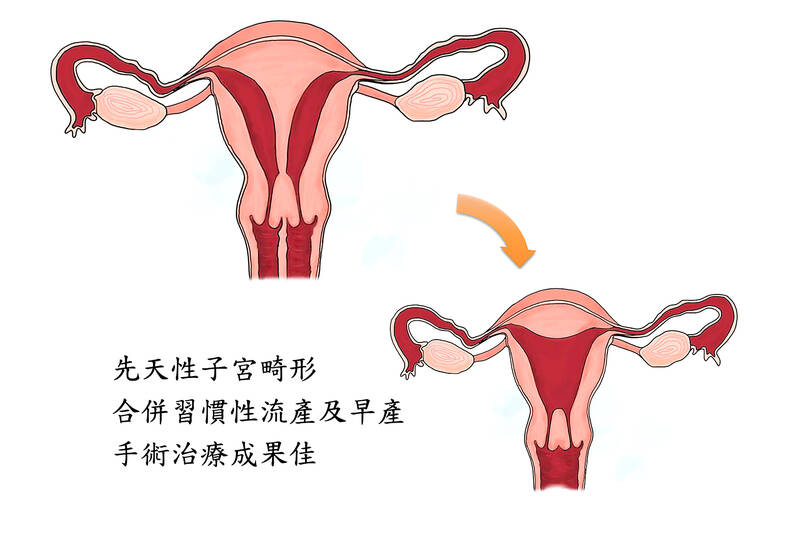National Taiwan University Hospital yesterday said that its novel method of hysteroscopic metroplasty has simplified the surgical procedure for people with a septate uterus and increased the success rate.
A septate uterus — the most common congenital uterine anomaly — is a condition in which a thin tissue membrane runs down the middle of the uterus and divides it into two parts.
A 33-year-old woman surnamed Chen (陳) said she had never had menstrual cramps and did not know she had a congenital uterine anomaly until she had difficulty getting pregnant and sought medical assistance.

Photo: Chiu Chih-jou, Taipei Times
She was found to have a complete septate uterus (CSU), with the thin septum running down the entire length of the uterus and the cervix, extending to the vagina, separating them into two, so she was transferred to a hospital, Chen said.
She received a cervix-preserving hysteroscopic metroplasty procedure at the hospital, and gave birth to a baby and is pregnant again, Chen said.
National Taiwan University Hospital Department of Obstetrics and Gynecology attending physician Yang Po-kai (楊博凱) said congenital uterine anomalies occur when an embryo is developing, and about 5 percent of all women have the condition.
A septate uterus is the most common congenital uterine anomaly, and it increases the risk of miscarriage, he said.
Although laparotomy (open abdominal surgery) is the conventional procedure for the condition, hysteroscopic metroplasty, a minimally invasive surgical procedure that involves cutting and removing the septum from the uterus, has become the most common treatment in the past few years years, Yang said.
CSU is a relatively rare condition, he said.
A hysteroscopic metroplasty for treating CSU is more difficult than other septate uterus cases, as an initial perforation needs to be made between the non-communicating cavities above the cervix to preserve the cervical architecture, he said.
The hospital said that Reproductive Endocrinology and Infertility Divison, led by Department of Obstetrics and Gynecology director Yang Jehn-hsiahn (楊政憲) performed hysteroscopic metroplasty on 58 CSU patients over the past 16 years and developed a new method with an increased success rate of initial perforation.
The team found that by applying progressively larger dilators into each of the bifurcated cervical canals, spontaneous perforations — progressive thinning of the cervical stroma, which causes the weaker portion of the septum to spontaneously tear — are applied to the uterine septum, Yang Po-kai said.
The novel surgical method improves the cervix-preserving hysteroscopic metroplasty by avoiding the need to make sharp incisions, he said.
The procedure has a higher success rate, which makes it a safer first option for all women with CSU, he added.
The team’s novel method was published in the Journal of Minimally Invasive Gynecology in September last year.

An undersea cable to Penghu County has been severed, the Ministry of Digital Affairs said today, with a Chinese-funded ship suspected of being responsible. It comes just a month after a Chinese ship was suspected of severing an undersea cable north of Keelung Harbor. The National Communications and Cyber Security Center received a report at 3:03am today from Chunghwa Telecom that the No. 3 cable from Taiwan to Penghu was severed 14.7km off the coast of Tainan, the Ministry of Digital Affairs said. The Coast Guard Administration (CGA) upon receiving a report from Chunghwa Telecom began to monitor the Togolese-flagged Hong Tai (宏泰)

A cat named Mikan (蜜柑) has brought in revenue of more than NT$10 million (US$305,390) for the Kaohsiung MRT last year. Mikan, born on April 4, 2020, was a stray cat before being adopted by personnel of Kaohsiung MRT’s Ciaotou Sugar Refinery Station. Mikan was named after a Japanese term for mandarin orange due to his color and because he looks like an orange when curled up. He was named “station master” of Ciaotou Sugar Refinery Station in September 2020, and has since become famous. With Kaohsiung MRT’s branding, along with the release of a set of cultural and creative products, station master Mikan

RISING TOURISM: A survey showed that tourist visits increased by 35 percent last year, while newly created attractions contributed almost half of the growth Changhua County’s Lukang Old Street (鹿港老街) and its surrounding historical area clinched first place among Taiwan’s most successful tourist attractions last year, while no location in eastern Taiwan achieved a spot in the top 20 list, the Tourism Administration said. The listing was created by the Tourism Administration’s Forward-looking Tourism Policy Research office. Last year, the Lukang Old Street and its surrounding area had 17.3 million visitors, more than the 16 million visitors for the Wenhua Road Night Market (文化路夜市) in Chiayi City and 14.5 million visitors at Tainan’s Anping (安平) historical area, it said. The Taipei 101 skyscraper and its environs —

Taiwan on Friday said a New Zealand hamburger restaurant has apologized for a racist remark to a Taiwanese customer after reports that it had first apologized to China sparked outrage in Taiwan. An image posted on Threads by a Taiwanese who ate at Fergburger in Queenstown showed that their receipt dated Sunday last week included the words “Ching Chang,” a racial slur. The Chinese Consulate-General in Christchurch in a statement on Thursday said it had received and accepted an apology from the restaurant over the incident. The comment triggered an online furor among Taiwanese who saw it as an insult to the